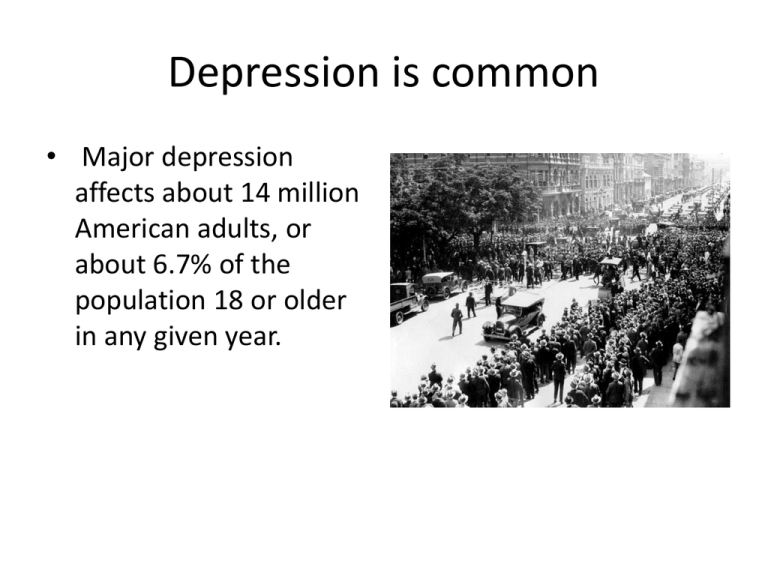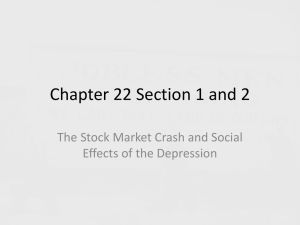
Depression is common
• Major depression
affects about 14 million
American adults, or
about 6.7% of the
population 18 or older
in any given year.
If You Are
• Feeling sad, empty,
hopeless, or numb..
• Loss of interest in things
you used to enjoy. You
might lose interest in sex.
• Irritability or anxiety.
• Trouble making
decisions.
• Feeling guilty or
worthless.
• Thoughts of death and
suicide.
Common Causes of Depression
•
•
•
•
•
•
•
•
Biology. Depression might also be affected by
changes in the levels of certain chemicals in the
brain, called neurotransmitters.
Genetics: Depression runs in your family.
Gender. t women are about twice as likely as men
to become depressed.
Age. People who are elderly are at higher risk of
depression.
Health conditions. cancer, heart disease, thyroid
problems, chronic pain, and many others increase
your risk of becoming depressed.
Trauma and grief. Trauma, such as violence or
physical or emotional abuse.
Changes and stressful events..
Medications and substances. Alcohol or substance
abuse
Sleep Problems
• Sleep Problems can be
a symptom of
depression. Trouble
falling asleep or staying
asleep is common in
people who are
depressed. But some
people with depression
may find that they sleep
too much.
Chest Pain
• Sometimes chest pains
can be a sign of
depression.
• A link between
depression and heart
disease.
• Depression increase risk
of heart disease.
• Heart attacks more
likely to be depressed.
Fatigue and Exhaustion
• Fatigue and Exhaustion: a
sign of depression.
• People with depression are
more than four times to
develop unexplained fatigue.
• People with fatigue are nearly
three times to become
depressed.
• Depression and fatigue
together tend to make both
conditions seem worse.
Muscle Aches and Joint Pain
• Pain and depression are
closely linked. people
with depression are
three times to develop
chronic pain.
• Chronic pain can
increase the risk of
depression.
Digestive Problems
• Depression can get you
in your gut too -causing symptoms of
nausea, indigestion,
diarrhea, or
constipation.
Headaches
• people with major
depression are three
times more likely to
have migraines.
• People with migraines
are five times more
likely to become
depressed.
Changes in Appetite or Weight
• Some people lose their
appetite when they feel
depressed.
• Others can't stop eating.
• Depression has been linked to
eating disorders like bulimia,
anorexia, or binge eating.
• Women, the link between
depression and anorexia or
bulimia is especially strong.
Back Pain
• Chronic back pain may
contribute to
depression.
• Depression may
increase a person's risk
of developing back pain
• People with depression
may be four times more
likely to develop
intense, disabling neck
or back pain.
Agitation and Restlessness
• Irritability and
restlessness may be
related to sleep problems
or other symptoms of
depression.
• Depression increases the
risk of alcohol or other
substance abuse.
• Men are more likely than
women to be irritable
when they're depressed.
Sexual Problems
• Severe depression,
especially, can have an
impact on sex.
• Some prescription
drugs – including for
depression -- can also
take away your sex
drive and affect
performance.
Dr. Zhao TCM For Depression
• Herbs for depression.
• Acupuncture.
• No risks, safe and
effects in 2-6 weeks.
• The herbs and
acupuncture can help
all the symptoms.
• See YIN-YANG balance,
Tension Free capsules.








